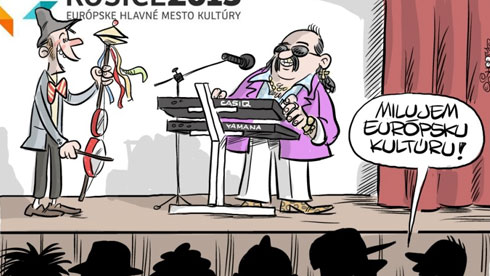Since January 1, Košice has borne the title of European Capital of Culture 2013 (ECOC). In Slovak this translates to Európske hlavné mesto kultúry but is most often simply abbreviated to EHMK. Often these initials are run together like a word. Pronounced "Ehmk", it sounds like a word from a computer language. Or like a sigh. "Ehmk, Košice."
Košice is a special city. First of all, it’s the only Slovak city, after Bratislava, that’s a real city. A city that after six o’clock in the evening doesn’t feel like a deserted skanzen (an open-air museum) and where a jazz concert, an opera premiere and a techno dance can be going on at the same time. A city that has not only its own face but its own sounds and smells.
But that’s not all. Košice is not, strictly speaking, a Slovak city. It’s not that you couldn’t get by if you spoke Slovak there. Cosmopolitan and Hungarian, it’s a city where you’ll easily find cafés serving strong Hungarian coffee from old kotyogó mocha pots and high-quality restaurants that greatly surpass the Slovak average.
‘Genius loci’ remains
It’s a city where people still stroll about the Main Square and where Slovaks, Hungarians and Czechs live in relative harmony (the largest number of them in Slovakia, thanks to the steel works and military aviation school). And Roma who, despite all sorts of social engineering efforts, still live in the city centre, and not just in the most famous Slovak Roma ghetto, the Lunik IX housing estate. Only Jews are missing in Košice, unfortunately. Behind them they left four synagogues, two meeting houses for prayers, two cemeteries, and a genius loci, or spirit of the place, still perceived by sensitive people.
In connection with the title of European Capital of Culture in 2013, the talk is about developing local culture, supporting the creative industries and deploying European funds to develop cultural infrastructure. The project, however, has been dogged by one embarrassment after another.
And it's not just about the fact that the talented (and ambitious) cultural manager Zora Jaurová, who was one of its creators, was removed from the project, or even the fact that almost every day brings news of sundry suspicious goings-on and behind-the-scenes pressures. There’s yet another problem lurking in plain sight.
Countdown underway
A week from now, on January 19 and 20, ECOC will officially get underway. Part of the “Countdown” is an installation by the Košice art group Kassaboys. Its members set up, in the centre of the city, dummy explosives stuffed with newspaper clips exposing corruption among the local councillors and primed the whole thing with a countdown device like something out of James Bond. Over the holidays, however, someone, “modified” the installation to render the names in the newspaper articles illegible.
Then the city published the programme for the opening ceremony. The main event will be a group called Jamiroquai (although, what relationship this 1990s British band has with Košice, no one has yet been able to discover). And because the band is not on tour the concert will be more expensive. But what the heck: ECOC has no problem with money, and so the promoter sponsored their gig with €250,000.
The icing on the cake was the news that Anna Gaja, an amateur Slovak singer best known for filming lascivious clips, would make an appearance at the opening ceremony. Ms Anna, incidentally, is the wife of the Mayor of Košice-North.
The ECOC project obviously brings a number of valuable, high-quality cultural events, and perhaps, even some of those investments into the artistic infrastructure will prove useful. Kosice will survive all this; but even so, it's strange. Ehmk, Košice.
Was this article useful? If so we are delighted!
It is freely available because we believe that the right to free and independent information is essential for democracy. But this right is not guaranteed forever, and independence comes at a cost. We need your support in order to continue publishing independent, multilingual news for all Europeans.
Discover our subscription offers and their exclusive benefits and become a member of our community now!












